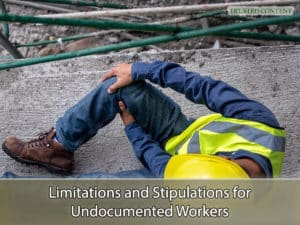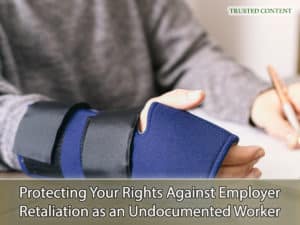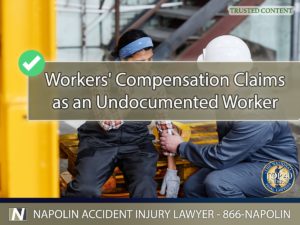Navigating Workers’ Compensation Claims as an Undocumented Worker in California
Navigating the workers' compensation system can be challenging, especially for undocumented workers in California. Despite federal immigration laws and the stigma around undocumented status, California provides unique protections for undocumented workers to receive benefits if injured on the job. Understanding your rights and seeking the right legal help is crucial for securing fair compensation. Many undocumented workers fear retaliation from their employers or worry about their immigration status affecting their eligibility for benefits. However, California law is clear about protecting all workers, regardless of their documentation status. By gaining insight into the state's workers' compensation laws, undocumented workers can safeguard their rights and ensure they receive the benefits they deserve.
Understanding Workers' Compensation Rights for Undocumented Immigrants
California law ensures that all employees, regardless of their immigration status, are eligible for workers' compensation benefits. Employers must have workers' comp insurance to cover work-related injuries. The California Department of Industrial Relations (DIR) strictly enforces this requirement, ensuring that all injured workers receive proper compensation. Workers' compensation provides coverage for medical treatment, temporary and permanent disability benefits, and supplemental job displacement benefits. The DIR aims to create an inclusive environment where undocumented workers can receive care without fear of immigration status repercussions. This inclusivity also extends to undocumented immigrants seeking legal advice, as lawyers are bound by confidentiality.
Rights Granted to Undocumented Workers
Medical Treatment and Permanent Disability: Undocumented workers can receive medical care and permanent disability benefits if they meet the criteria. The criteria include proving that the injury was work-related and that it impacts the worker's ability to perform regular duties. Permanent disability is determined based on an impairment rating assigned by a medical examiner.
Lump Sum Settlements or Stipulated Awards: Undocumented workers can receive lump-sum settlements or stipulated awards for their injuries. A stipulated award involves an agreement between the injured worker and the employer/insurance company regarding future medical treatment and disability benefits. Lump-sum settlements are typically offered to resolve claims in their entirety.
Uninsured Employers Benefits Trust Fund (UEBTF): If the employer is uninsured, undocumented workers can still receive benefits through the UEBTF. This fund provides financial assistance to injured workers when their employer fails to carry the required workers' comp insurance. Undocumented workers are eligible to receive medical care, disability benefits, and vocational rehabilitation assistance through this fund.

Limitations and Stipulations for Undocumented Workers
Limitations and Stipulations for Undocumented Workers
Light Duty Work and Temporary Disability Benefits
Undocumented workers are not eligible for temporary disability benefits if they can perform modified or light-duty work that allows them to continue earning wages. California law requires employers to offer alternative work options that accommodate the worker's medical restrictions. However, employers may use the worker's undocumented status to deny modified work, thereby limiting their eligibility for temporary disability benefits. In these cases, it's essential for the worker to seek legal advice to ensure their rights are not violated. Employers must provide accurate information regarding the availability of modified work and the worker's eligibility for disability benefits.
Permanent Job Displacement and Vouchers
Undocumented workers cannot receive job displacement vouchers if a permanent job is available to them, even if they are undocumented. A job displacement voucher is typically offered when the employer cannot provide suitable alternative employment. However, if the worker is unable to perform their regular job due to injury, but the employer offers modified or alternative work that the worker can perform, the voucher is not provided. This limitation highlights the importance of understanding the specific criteria for job displacement benefits. Workers should carefully review their employment options before accepting or rejecting a job displacement voucher.
Fraudulent Employment Status and Impact on Workers' Comp Claims
Fraudulent employment status does not prevent undocumented workers from receiving benefits. California law separates workers' compensation claims from issues of employment fraud. However, falsifying information to gain benefits can stop compensation. Employers and insurance companies may challenge claims if they believe the worker provided false information. Despite this, the California Workers' Compensation Appeals Board (WCAB) has ruled that fraudulent employment status should not impact a worker's eligibility for medical care and permanent disability benefits. Legal representation can help undocumented workers navigate these challenges.
Things Undocumented Workers Seeking Workers' Comp in California Should Know
Potential Challenges and Employer Disputes
Undocumented workers may face challenges from employers disputing their claims due to their illegal status. Employers are legally obligated to verify employee documentation and may use undocumented status to deny benefits. This is a common tactic used to intimidate workers into dropping their claims or accepting lower settlements. Moreover, employers may retaliate against workers by threatening to report them to immigration authorities. These challenges emphasize the need for legal representation to protect workers' rights. Undocumented workers should document their injuries, medical treatment, and communications with employers to strengthen their claims.
Filing for a Mandatory Settlement Conference
To counter employer disputes, injured parties can file for a mandatory settlement conference. This conference provides an opportunity for the worker and employer to resolve the dispute with the help of a workers' compensation judge. The conference is a crucial step in the claims process, as it allows both parties to present evidence and negotiate a settlement. Accurate documentation and legal representation are vital for a successful settlement. If the dispute cannot be resolved at the settlement conference, the case proceeds to trial.
Importance of Accurate Documentation and Representation
Undocumented workers must provide accurate documentation of their employment and injuries. Medical reports, witness statements, and employment records can significantly impact the outcome of a workers' compensation claim. Additionally, having an experienced lawyer ensures proper representation and increases the chances of a favorable settlement. Lawyers can help workers gather evidence, navigate the legal system, and negotiate with employers and insurance companies. By securing legal representation, undocumented workers can avoid common pitfalls and protect their rights.

Protecting Your Rights Against Employer Retaliation as an Undocumented Worker
Protecting Your Rights Against Employer Retaliation as an Undocumented Worker
Employer Obligations and Federal Immigration Laws
Employers must carefully vet employees' identities before hiring. They can face criminal charges if they knowingly employ undocumented immigrants. However, federal immigration laws also prohibit employers from retaliating against workers who file workers' compensation claims. Retaliation includes threats of deportation, termination, or reduced work hours. Employers must provide workers with information about their rights and workers' compensation benefits.
California Protections for Undocumented Workers
California law protects undocumented workers from discrimination and ensures they receive workers' compensation benefits. The California Fair Employment and Housing Act (FEHA) prohibits employers from discriminating against workers based on immigration status. Additionally, the California Labor Code provides specific protections for undocumented workers, including the right to receive benefits and file claims without fear of retaliation. Employers who violate these protections can face significant penalties.
Handling Employer Disputes and Filing Complaints
Undocumented workers facing retaliation or denied benefits can file complaints with California's Labor Commissioner's Office. The office investigates complaints of employer misconduct and enforces labor laws. Workers can also file complaints with the California Department of Industrial Relations. These agencies ensure that workers receive the benefits they are entitled to and that employers are held accountable for their actions.
How Napolin Accident Injury Lawyer Assists Undocumented Workers
- Extensive experience in workers' compensation litigation
- Tailored legal strategies for undocumented workers
- Our compassionate approach that prioritizes client well-being and ensures fair compensation
- A thorough understanding of California workers' compensation laws and immigration protections
- A dedicated team ready to assist with every step of the claims process, from filing to settlement

Navigating Workers' Compensation Claims as an Undocumented Worker in California
Navigating Workers' Compensation Claims as an Undocumented Worker in California
Securing legal representation is crucial for undocumented workers navigating workers' compensation claims. Napolin Accident Injury Lawyer ensures fair compensation through extensive litigation experience and tailored strategies. We have helped numerous clients obtain the benefits they deserve, regardless of their immigration status. Our team is committed to leveling the playing field for injured workers and holding employers accountable. Call us at (866)-NAPOLIN for a free consultation and secure the benefits you deserve.
- Understanding Uber Accidents and Insurance Coverage Periods in California - April 8, 2025
- A Guide on Red Light Auto Accidents in California - August 14, 2024
- Self-Representing in a California Personal Injury Claim - August 13, 2024
